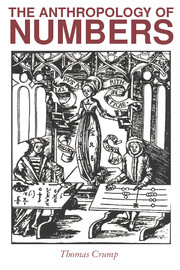Book contents
- Frontmatter
- Contents
- List of illustrations
- Preface
- Acknowledgements
- 1 The ontology of number
- 2 The cognitive foundations of numeracy
- 3 Number and language
- 4 Cosmology and ethnoscience
- 5 Economy, society and politics
- 6 Measurement, comparison and equivalence
- 7 Time
- 8 Money
- 9 Music, poetry and dance
- 10 Games and chance
- 11 Art and architecture
- 12 The ecology of number
- Notes
- References
- Index
- Cambridge Studies in Social and Cultural Anthropology
12 - The ecology of number
Published online by Cambridge University Press: 05 June 2012
- Frontmatter
- Contents
- List of illustrations
- Preface
- Acknowledgements
- 1 The ontology of number
- 2 The cognitive foundations of numeracy
- 3 Number and language
- 4 Cosmology and ethnoscience
- 5 Economy, society and politics
- 6 Measurement, comparison and equivalence
- 7 Time
- 8 Money
- 9 Music, poetry and dance
- 10 Games and chance
- 11 Art and architecture
- 12 The ecology of number
- Notes
- References
- Index
- Cambridge Studies in Social and Cultural Anthropology
Summary
The practical conclusion from the preceding chapters is that the series of natural numbers, together with the basic arithmetical operations of addition and subtraction, multiplication and division, are a resource open to use in almost any culture. On the other hand, the extent of utilization, varies very greatly. The same is true not only of the different types of use, but also of the different ways in which numbers are understood. In sub-Saharan Africa, for instance, numeracy is certainly implicit in a sophisticated game like oware, or in any number of intricate musical rhythms, but there is little explicit numerology, or lore of numbers, of the kind which one may take for granted in India, south-east Asia, China and Japan.
What then are the factors which determine the character of a particular numerical tradition? Is there a cultural ecology of numbers? If so, how important is the distinction between traditional and modern? Looking at such questions, one finds that this last distinction is significant, and that in a number of ways. In the first place, the traditional use of numbers, in the sense of numerical institutions which are generally accepted as an integral, stable and long-standing part of any given culture, is seldom practical according to the standards of any modern society.
- Type
- Chapter
- Information
- The Anthropology of Numbers , pp. 146 - 150Publisher: Cambridge University PressPrint publication year: 1990



